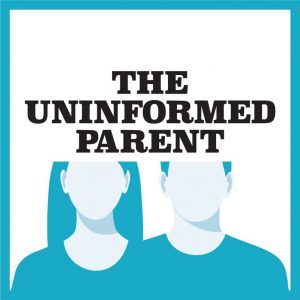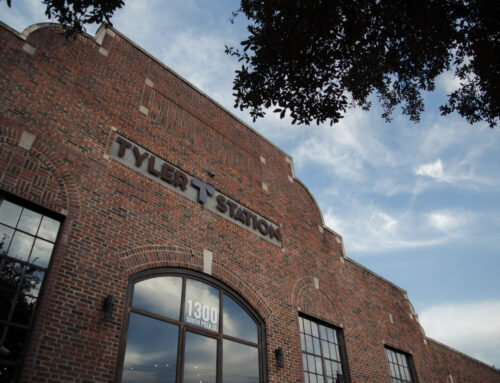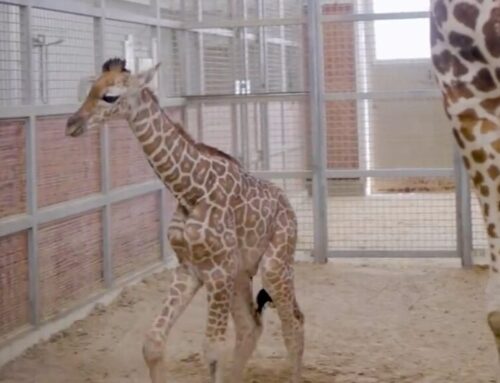 Episode 14: Botello Elementary Principal Maria Puente is relatively new to the job but she isn’t new to the school. Puente served as assistant principal under Dr. Reyna Sotelo, who was promoted to oversee several schools in Oak Cliff and left Botello in the capable hands of her teammate.
Episode 14: Botello Elementary Principal Maria Puente is relatively new to the job but she isn’t new to the school. Puente served as assistant principal under Dr. Reyna Sotelo, who was promoted to oversee several schools in Oak Cliff and left Botello in the capable hands of her teammate.
Puente has carried on the vision of Botello growing and rising above the rest. Its personalized learning curriculum is now in full effect, and Puente believes it could make the school even more successful than it already is.
Word is starting to spread in the community about this undiscovered gem. Botello has room for both transfer students and neighborhood students who aren’t currently opting in — and Puente says the school is ready to welcome students with open arms.
Even though Botello is impressive on paper, touring the school left an even stronger impression on Becca Leonard.
Podcast credits: Keri Mitchell, produced by Advocate Magazines
Full transcript
Botello Elementary Principal Maria Puente is relatively new to the job but she isn’t new to the school. Puente served as assistant principal under Dr. Reyna Sotelo, who was promoted to oversee several schools in Oak Cliff and left Botello in the capable hands of her teammate.
Puente has carried on the vision of Botello growing and rising above the rest. Its personalized learning curriculum is now in full effect, and Puente believes it could make the school even more successful than it already is.
Word is starting to spread in the community about this undiscovered gem. Botello has room for both transfer students and neighborhood students who aren’t currently opting in — and Puente says the school is ready to welcome students with open arms.
Keri Mitchell: So AVID has been around for awhile at Botello, yes?
Maria Puente: Yes.
Keri Mitchell: How does that work here? What does that look like?
Maria Puente: Well, it looks a little bit differently in elementary than it does in junior high and high school, and so we try to lay the foundation of note-taking skills and organization. We have a lot of college awareness, you know, with the kids, and that’s from pre-K all the way up to fifth-grade. And one of the main points that the parents love and the kids love is that they all go on a university field trip. So that’s from pre-K to 5th.
Keri Mitchell: So you’ve got preschoolers visiting college campuses?
Maria Puente: Yes, absolutely.
Keri Mitchell: And what is that like?
Maria Puente: So, what pre-K usually tries to lean to is [the University of Texas at Arlington], because they have a planetarium there. And so they also do a small college tour and kind of talk to them about, you know, this is what you do after high school because we try to push them, you know, to go to college after that. And I mean, same thing with the kinder and first-graders. The grade level of teachers are the ones that actually choose which university they want to go to. Last year, fourth-grade went to Baylor University. So somewhere outside of Dallas, so they can also say, “Oh there’s universities, you know, everywhere. We’re not just limited to the ones here.”
Keri Mitchell: What do you, what do you see happen? Has AVID been around long enough at Botello that you can kind of see the trajectory for kids that have gone through the program, like kind of what they end up either doing in middle school or high school that’s different than maybe what some of their peers do? Have you seen any kids go onto college yet?
Maria Puente: Not yet. So when I got here, AVID was already implemented. The year that I got here, we went all the way down to pre-K, and so have I seen a difference? Yes, definitely. The kids already here, they get used to it. They get used to note-taking. They get used to organization, but the kids that we get from either other schools or other districts or out of town, it’s new to them, and so when they come to us, they’re a little disorganized. They’re not sure how to take notes, how to study from their notes, and once they have the implementation you can see a real change in them.
Keri Mitchell: Interesting. So what do the parents think of it? What do, how are they educated on what’s happening here?
Maria Puente: We have AVID monthly parent meetings, and so one Friday every month we invite the parents to come over and we talk about different AVID strategies [and] how they could help them. So one of the biggest complaints that we typically get is the binders that we purchase for them. We purchase binders for the students. Once they understand why to have those binders, why it’s necessary to put certain things in those binders, how they use them and how it helps the students to understand, [it gets better]. We also encourage them to utilize the planners that we purchase for them as well.
Keri Mitchell: It sounds like they’re taking, they’re using all this to kind of become more independent, to take their own initiative to do things. It’s not mom and dad having to keep track of everything at home, reminding you to do homework and to do this or that or the other.
Maria Puente: Yes, and that’s where the planners come in place in the organization because they’ll write in there, you know, when they have a major test coming up; if they have any homework, they’ll have study buddies.
Keri Mitchell: Wow. Yes. I mean your guys’ scores are off the charts, really. There’s all kinds of systems of scoring, as you know, from various perspectives and purposes. But no matter how you slice it, Botello does very, very well. What do you credit that to?
Maria Puente: One would be the teacher dedication that we have on campus, because they have such a growth mindset that goes onto the kids. And you know, if the kids don’t believe in the teachers, they’re not going to perform. So they trust the teachers, they believe in them and they’ll do whatever it takes to get where they need to go.
Keri Mitchell: That’s pretty impressive. So PL, personalized learning, that’s new this year to Botello? Why did you decide to go that route?
Maria Puente: We were already starting to go that route. We had already. We tried implementing stations a couple of years ago, introducing them to the teachers. We’re a campus that, we like to excel. We knew we could, you know, try to advance in our academics. And so after we looked at the research a little bit more we were like, “Hey, this could work and in order for us to reach all of the kids, you know, all the kids at their levels.” And so before we got approved for the proposal that we wrote, we were already in stations. We hadn’t quite mastered the personalized learning part. I mean, they were still working on it, but it’s just something that we felt would benefit our kids.
Keri Mitchell: So if I’m a parent and I live in this area and I’m looking at sending my kid to Botello, what does personalized learning mean for my child? What will happen when my child enters the classroom?
Maria Puente: I will tell you what will not happen. What will not happen is you will not go into any classroom and see the old desks in a row, the teacher teaching for 45 minutes while the kids are sitting at their desks. When you walk into the classroom, you’ll see flexible seating everywhere, where the students will be in different stations. All the stations are, of course, important, but we focus a lot on our teacher station or the face-to-face station, and they will work with your child at the level that they’re at, whether it’s a high-level kid or medium, you know, on grade level, or if they’re struggling. They’re meeting them where they’re at and pushing them up to the next level.
Keri Mitchell: Now, even if they’re the highest of their classes?
Maria Puente: Yes. Even if they’re at the highest of their class, they’ll pull those kids and work with them to push them to push them up.
Keri Mitchell: What have you seen this do at your campus so far?
Maria Puente: It really has honed in. When we talk about data-driven instruction, the teachers have really taken the time to look at the kids individually and not as a whole class or as a whole grade level.
Keri Mitchell: That seems like it would take a lot more time and energy and work?
Maria Puente: It does and so one of the things that we did differently this year in our schedule is, I incorporated an extra 45 minutes every other week for the teachers, and so that gives them a little time to plan vertically for the stations and to look at their data.
Keri Mitchell: Wow. I’ve heard personalized learning referred to as “high-tech Montessori.” What do you think of that? That kind of wholistic, focusing on the individual child?
Maria Puente: Well, I don’t, I don’t know about high-tech Montessori, but the technology part is great. I mean it’s a great tool, but it doesn’t take place of the teaching. The kids, I believe, in a Montessori, they go up levels or whatnot. In PL, they do not go up grade levels. However, we do adjust the curriculum to what their needs are. So in that sense they’re probably similar.
Keri Mitchell: OK, that makes sense. What else is going on here that you want to talk about?
Maria Puente: Well, besides avid and the personalized learning, I think that we’re just trying to take it to the next level. We always focus on academics. This school year we’re shooting for those six distinctions; you know, we missed it by a few points last year. So that’s our goal this year. [We’re] trying to reach the community a bit more.
Keri Mitchell: Talk to me about that a little bit.
Maria Puente: So we have a new parent instructor, and we’ve reached out to a couple of businesses. We’re actually going to reach out … I don’t know if I should let my secret out, but we’re actually reaching out to IKEA to see if they would partner up with us to donate some furniture.
Keri Mitchell: Oh wow.
Maria Puente: We’ve done several fundraisers and we’ve had enormous turnouts. So the community is definitely willing to come in and they want to come in and be a part of the school, and I’m more than welcoming them inside the school.
Keri Mitchell: And you know, we’ve covered a family in this neighborhood who kind of ended up here in some ways by default and has just been singing its praises, the school’s praises, ever since. Like many schools in this area you’ve got a lot of families moving in who aren’t yet either familiar with, or their perceptions of public school are still kind of forming. Do you see any progress in that area?
Maria Puente: I do have progress. So I already have students or parents that have applied to our school on the transfer list.
Keri Mitchell: Really?
Maria Puente: Yes. And it kind of shocked me because I already have, you know, a few of them like three or four, and we haven’t really advertised. So that’s a positive note for us on what we’re doing with the kiddos and the community. Really honestly, in this community, it’s word of mouth, you know? I know there’s a lot of charter schools here, and typically what we get is if they leave here to go over there they come right back. They come right back.
Keri Mitchell: What do they tell you when they come back? Why? Well maybe, why are they here? Not necessarily why did they leave.
Marie Puente: OK, So one of the reasons why they come back is the teacher focus on their students. They give the kids what they need.
Keri Mitchell: And you have really experienced teachers here?
Maria Puente: Yes, I do. I have a wide range of teachers. We have some very experienced teachers that have 20-30, over 30 years, and then we have quite a few teachers that have up to five years of experience.
Ashley Bryan: That’s great. You talked a lot about, you know, the teachers and the culture here. What else would you say makes Botello special or makes it a place that you want to be every day?
Maria Puente: Honestly it’s because our school, yes, it is a public school in the ISD, but we’re a family. Parents know that they can come up, and I make myself available to them. The teachers make themselves available to them. When you come in, you’ll see that the students will give teachers, that are not their teachers, specific teachers will hug them on the way in. They will literally stand there and look at them and you know, the teacher, like, “Do you need a hug?” And they say, “Yes” and they’ll give them a hug, you know, that’s just the environment that we have. That and one of the other things that we did this year that I think the kids love are all the extracurricular activities that we have. We have over 20 extracurricular activities on this campus. Something as simple as coloring, the coloring club, to a Rubik’s club, cursive club. We finally started our first choir. So we have so many activities for them to do. I think they’re about to start a ballroom dancing club.
Keri Mitchell: I want to be in that!
Maria Puente: One of our parents does pilates once a month. If the kids see the parents and the teachers working together, why would you not want to come to school?
Keri Mitchell: And it sounds like the kids want to come to school.
Maria Puente: Yes they do. Yes they do.
Keri Mitchell: What was the impetus for all the new extracurriculars?
Maria Puente: Well we started off with Afterschool All-Stars, which is a great, great program, but they focused on fourth- and fifth-grade. So our little kids were really not involved in anything. We have a great community but we have a lot of our kids come from different home lives. We have some kiddos that are in shelters or in foster homes, single-parent homes. And what the extracurricular activities do is they help some of these parents keep them in a positive environment. And for those parents that work late, you know, they don’t have to worry about oh my God, who’s gonna pick up my child. You don’t have to worry about daycare because there will be an activity here.
Keri Mitchell: That’s great.
Maria Puente: So kind of helping them out and us in return, too, because the kids have to be here in order to go to an extracurricular activity.
Ashley Bryan: So is there anything else that you feel like people should know about the Botello that you haven’t shared?
Maria Puente: For parents that are curious about Botello. I would ask them to come visit, because I really do feel like actions are better than words. I can tell you what I feel about Botello all day, all night. But if you really do come on any given day, you will see what happens here. What goes on here is exactly what I said times 10.
Keri Mitchell: Yeah, I did an event this weekend where I gave “seven parent hacks” — that’s what we called it just to be quippy — about how to find a school for your child. And my very first one was, tour every school you’re interested in and tour your neighborhood school, period.
Maria Puente: I will tell you this, we partnered up with Texas Tech, and so we have some teacher candidates on our campus. They were teacher candidates last year. This year, they’re teachers. But it was funny to me, because I was speaking to one of the teacher candidates and he said, “Yeah, I didn’t want to be here. I didn’t want to be here because I didn’t know what Botello was [or] who was there. I knew I wanted to be at so and so school, but the first day I walked in, which was the solar eclipse day.” And so I like to play with my staff [to] kind of let the tension off. And I came in with some solar eclipse gum, and I had a little note on there for everybody. And he said, “When you passed out that gum, I was like, I’m here to stay.” And so I asked him recently, “So you still want to go to the other school?” He was like, “I never said I wanted to go to another school.” He’s like, “I want to stay here.” Which is good because we have a lot of teacher retention. That made me feel good about our school and the culture that we have here.
Keri Mitchell: Yes. For sure! That’s funny. Solar eclipse. I like it. How many of the parents went to college? Are you training kids to be ready for college who came from families who didn’t necessarily?
Maria Puente: Yes, and so I’ll give you a prime example. We have a student in kindergarten who was struggling and so the teacher has been focusing on him quite a bit to try to help. And so, our kindergarten team has their own parent meetings where they bring the parents in and they tell them how they can help their child at home. But this particular parent could not read — and we have quite a few of them. They cannot read. So what our parent instructor did was reach out to their parents and say, “Come in, we want to help you,” because if your child sees you learning, that’s going to motivate them. And so now our kinder teacher has made it a point to stay a certain day to work with her and teach her how to read and so forth.
Keri Mitchell: Wow. That’s incredible.
Maria Puente: Our parents are kind of neat. Some of them are college grads and, you know, they have their professions, and we have others that didn’t make it through high school. So we have a wide range.
Keri Mitchell: That makes sense. When you tell people stories about Botello — like, if you say, “Here’s a great story of something that happened that kind of encapsulates your school” — what stories come to mind?
Maria Puente: I try to focus on the kids, because that’s really where our heart is. Our heart is with the kids. Our fifth-grade team, they really pushed the kids quite a bit, because there’s a huge gap between fifth and sixth grade. That’s a huge jump going from from elementary to junior high. And so one of the things they do is they push academics, and there’s been several instances. For example, we have our AVID model day, where campuses from the district [or] outside the district or even out of state will come and visit our campus. We have students that will speak to them, and normally you think, oh yeah, they’re going to get the highest kids, but the one thing we do is we get a range of kids. We’ll get, you know, our kids that are mastery level, kids that are, you know, right on grade level and kids that are, you know, we’re still working with them. They still need a little more push. We had just gotten the results back, and one of these students, he wasn’t quite successful in third and fourth grade on the state exams, but he was constantly improving. You could see the progress. And so we had already received the results back, and we hadn’t told the kids. And so he actually passed all of his assessments that year, and he was talking to the people, you know, the people that were there visiting. He was like, “Yeah, I wasn’t organized on how I can take notes. Now, I know what to study.” And so one of the teachers came behind him and said, “I just want to let you know that you passed your state exam.” He just started crying. He started crying, because he that was something that he had accomplished that he had been trying to accomplish. And finally he was there. So after that it was just straight soaring, straight soaring for him.
Keri Mitchell: I can imagine. The visitors had to just react in some sort of very excited way.
Maria Puente: He was very excited, and he finally composed himself and said, “This is what AVID does.” So it was a really great moment for and for the staff and for the people that were there.
Keri Mitchell: That’s incredible. Thank you for your time. I really appreciate it.
Maria Puente: Of course.
Thanks for listening to The Uninformed Parent. In the next episode, we’ll talk to Dallas ISD’s Cecilia Oakeley to learn about how the district ranks its schools, and to education expert Pedro Noguera about how he believes parents should choose schools.
This podcast is a production of Advocate Magazines with music by HookSounds.





